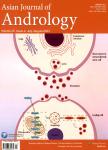Sperm retrieval and intracytoplasmic sperm injection outcomes in men with cystic fibrosis disease versus congenital bilateral absence of the vas deferens
作者机构:Scott Department of UrologyBaylor College of MedicineHoustonTX 77030USA Department of UrologyUNC School of MedicineChapel HillNC 27599USA UNC FertilityRaleighNC 27617USA
出 版 物:《Asian Journal of Andrology》 (亚洲男性学杂志(英文版))
年 卷 期:2021年第23卷第2期
页 面:140-145页
核心收录:
学科分类:1002[医学-临床医学] 100210[医学-外科学(含:普外、骨外、泌尿外、胸心外、神外、整形、烧伤、野战外)] 10[医学]
主 题:congenital bilateral absence of the vas deferens cystic fibrosis intracytoplasmic sperm injection outcomes male infertility obstructive azoospermia
摘 要:Recent data suggest that cystic fibrosis transmembrane conductance regulator(CFTR)gene alterations negatively impact male fertility beyond *** sought to compare gene alterations,sperm retrieval rates,and intracytoplasmic sperm injection(ICSI)outcomes among men with cystic fibrosis(CF)disease and congenital bilateral absence of the vas deferens(CBAVD)*** retrospectively evaluated all men who underwent surgical sperm retrieval at two academic,high-volume andrology centers from 2010 to *** men with documented CFTR alterations and obstructive azoospermia from either CBAVD or CF were *** between groups for CFTR abnormality,sperm retrieval,and ICSI outcomes were statistically ***,39 patients were included with 10 in the CF and 29 in the CBAVD *** sperm retrieval rates were significantly lower in the CF group for sperm concentration(14.8×10^(6)ml^(-1)vs 61.4×10^(6)ml^(−1),P=0.02)and total motile sperm count(2.9 million vs 11.4 million,P=0.01).This difference was only predicted by homozygous delta F508 CFTR mutations(P0.05).The CF group also demonstrated a significantly higher rate of rescue testicular sperm extraction(70.0%vs 27.6%,P0.03)and lower fertilization rate with ICSI(32.5%vs 68.9%,P0.01).In conclusion,those with CF demonstrated lower sperm quality,greater difficulty with sperm retrieval,and worse ICSI outcomes compared with CBAVD-only *** delta F508 CFTR mutations appear to significantly impair spermatogenesis and sperm function.



